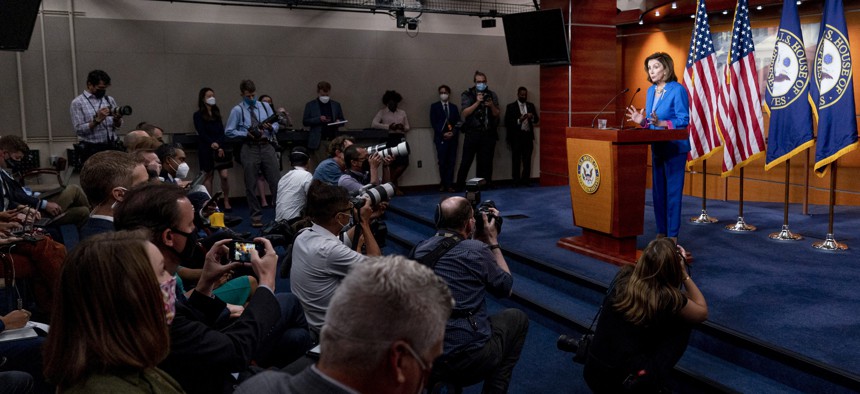House Delays Infrastructure Vote as Democrats Struggle to Reach Deal

House Speaker Nancy Pelosi of Calif. speaks during her weekly press briefing on Capitol Hill, Thursday, Sept. 30, 2021, in Washington. AP Photo/Andrew Harnik
House Speaker Nancy Pelosi wanted a vote on the infrastructure bill Thursday but without agreement on a broader social spending package, dozens of members of the Democratic party said they wouldn’t back the public works measure.
Democratic leaders and the White House failed to reach a deal Thursday that would allow a vote on the $1.2 trillion infrastructure bill to proceed.
A stalemate between centrist and progressive Democrats over the ultimate fate of a broader social spending package sidelined Thursday’s expected vote on the infrastructure proposal.
“Discussions continue with the House, Senate and White House to reach a bicameral framework agreement to Build Back Better through a reconciliation bill,” House Speaker Nancy Pelosi wrote in a “dear colleague” letter sent to lawmakers around 10 p.m. Thursday.
The letter did not provide any further clarity on next steps, or when a vote on the infrastructure bill could take place. Pelosi had planned to hold a vote on infrastructure Thursday. But she has vowed not to bring a bill to the House floor for consideration if she does not have the support to ensure it will pass.
The House will reconvene Friday morning, but the fate of both the infrastructure legislation and the social spending bill remain uncertain with members of the Congressional Progressive Caucus unwilling to back one without the other.
“We will not be able to vote for the infrastructure bill until the reconciliation bill has passed. So, we're in the same place," said. Rep. Pramila Jayapal, the caucus leader, during a Thursday afternoon press conference at the Capitol. “We are ready to vote for both bills.”
Jayapal confirmed Thursday that about half of her nearly 100-member caucus—enough to sink the infrastructure bill, as Republicans do not intend to vote for it—will not support the public works measure.
“There are too many of us that have been very clear that we are going to deliver on the entirety of the president’s agenda,” she said.
The infrastructure bill contains about $550 billion in new spending over five years to modernize roads, bridges and transit systems while also funding broadband, water and power projects. The bill also reauthorizes existing transit programs, funding which Pelosi noted was set to expire Thursday without the bill’s passage.
The infrastructure bill was previously approved by the Senate, so House passage would send it to President Biden’s desk.
Even as Pelosi maintained optimism and kept negotiations going throughout the day, key Democrat centrist, Sen. Joe Manchin of West Virginia, threw cold water on the hopes of reaching an agreement with the White House on the broader spending package. Manchin confirmed that his top line for the social spending proposal is $1.5 trillion—far below the $3.5 trillion proposed by the White House.
There was some positive momentum on Thursday as lawmakers passed and Biden signed into law a short-term spending bill that will avoid a government shutdown through Dec. 3.
The White House issued a statement Thursday night thanking all involved for their work on the negotiations.
“A great deal of progress has been made this week, and we are closer to an agreement than ever,” press secretary Jen Psaki said in a statement. “But we are not there yet, and so, we will need some additional time to finish the work, starting tomorrow morning first thing.”
Andrea Noble is a staff correspondent with Route Fifty.
NEXT STORY: House to Vote This Week on Infrastructure Bill





